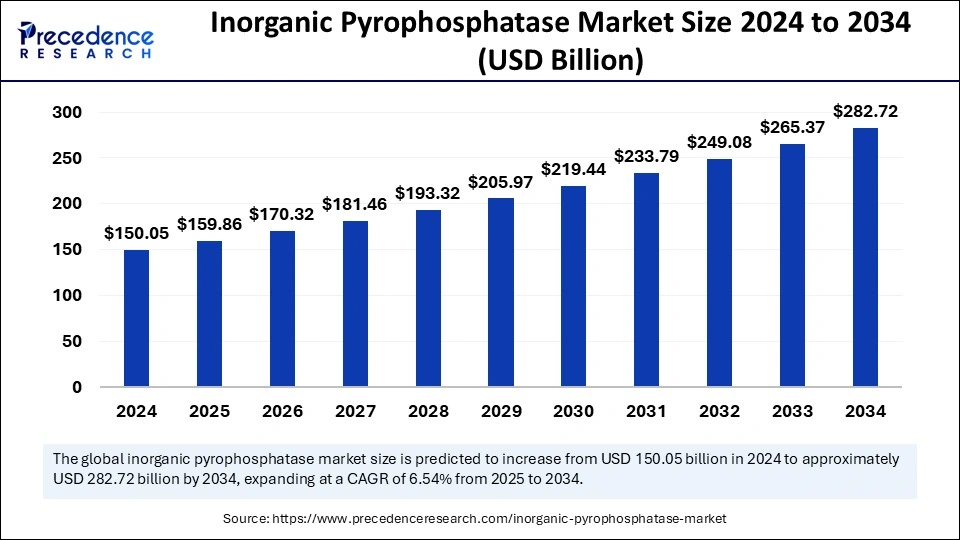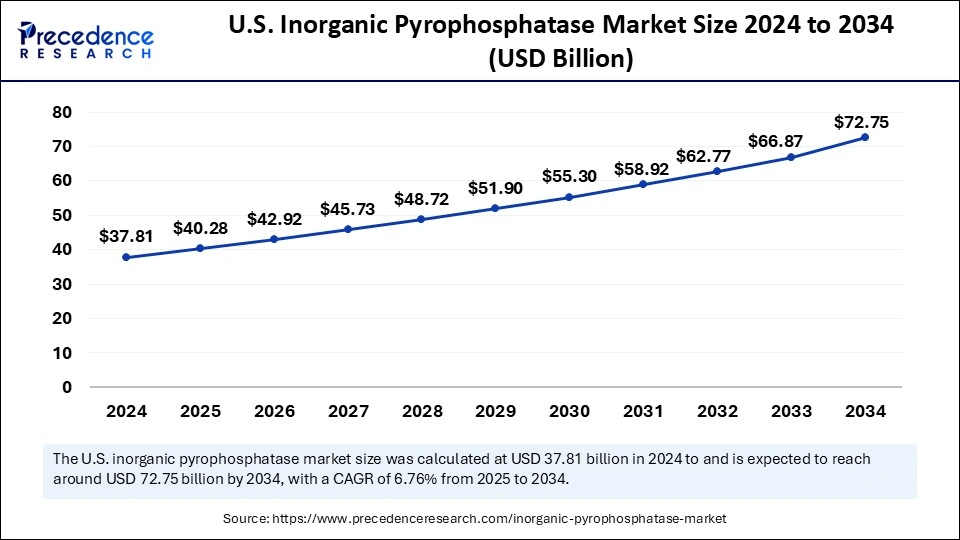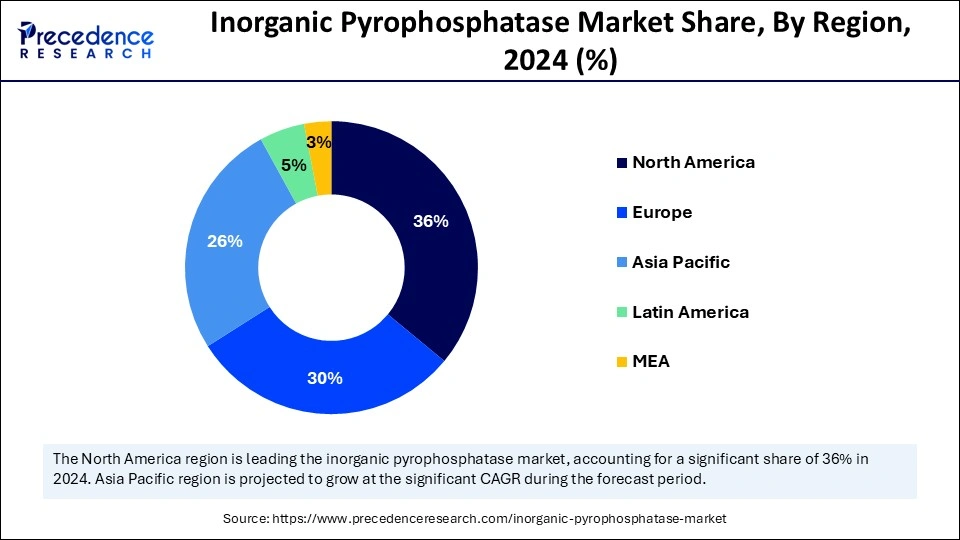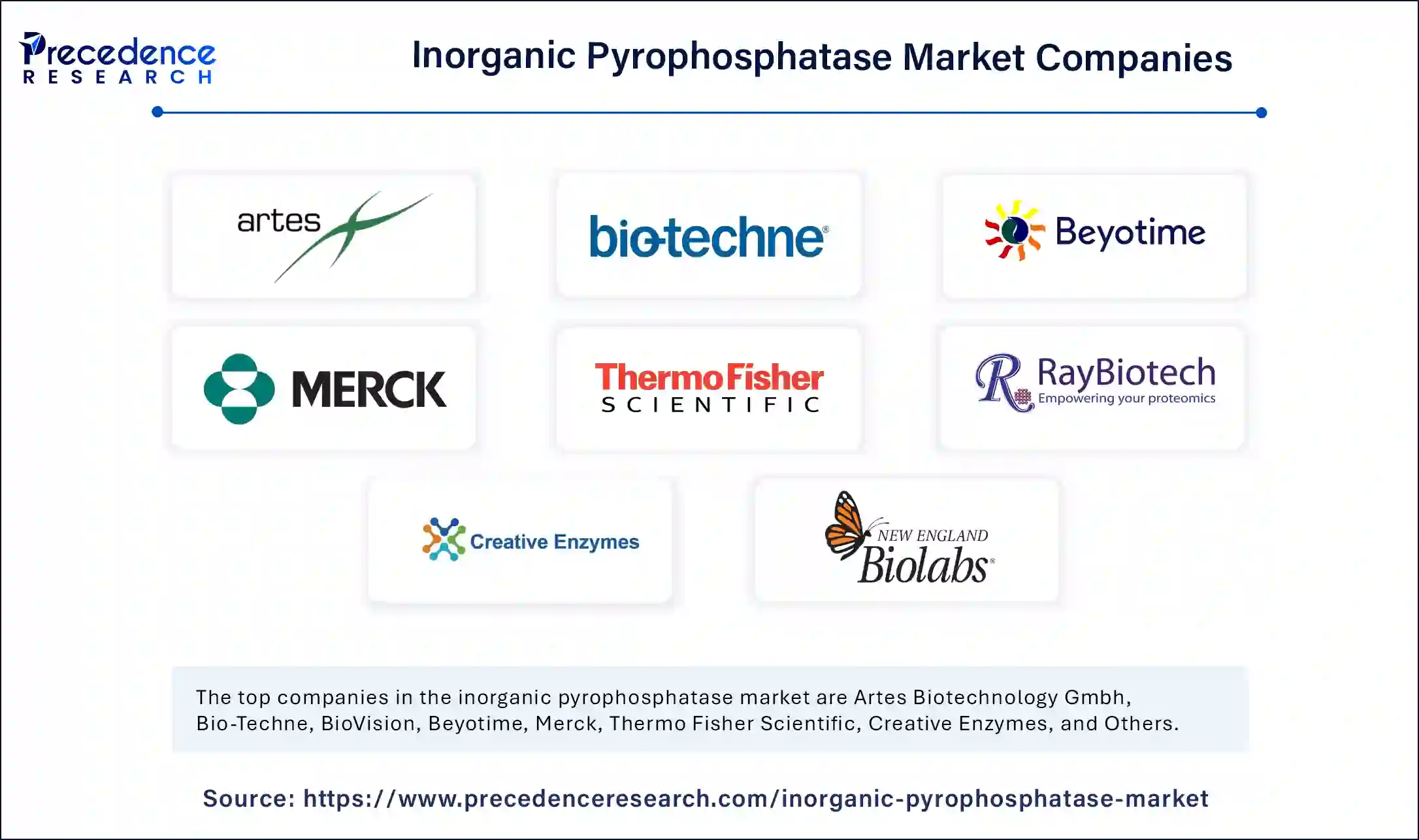August 2024
The global inorganic pyrophosphatase market size is calculated at USD 159.86 billion in 2025 and is forecasted to reach around USD 282.72 billion by 2034, accelerating at a CAGR of 6.54% from 2025 to 2034. The North America market size surpassed USD 54.02 billion in 2024 and is expanding at a CAGR of 6.69% during the forecast period. The market sizing and forecasts are revenue-based (USD Million/Billion), with 2024 as the base year.
The global inorganic pyrophosphatase market size was estimated at USD 150.05 billion in 2024 and is predicted to increase from USD 159.86 billion in 2025 to approximately USD 282.72 billion by 2034, expanding at a CAGR of 6.54% from 2025 to 2034. The growth of the inorganic pyrophosphatase market can be linked to the increased emphasis on developing life-changing small molecule therapies for underserved rare diseases, ongoing clinical trials and expansion of the biotechnology sector.

Artificial intelligence can be incorporated for studying, analysing, and predicting the activity of inorganic pyrophosphatase (PPase) which is a key enzyme in several biochemical processes. Leveraging machine learning models and AI algorithms in structural and functional analysis of PPase structures for kinetic modelling such as in understanding enzyme kinetics, for predicting reaction rates of PPase-catalyzed reactions for comprehending metabolic pathways and designing of experiments, identification of optimal conditions for developing streamlined experiments and assays.
AI can also be applied for discovering and designing inhibitors, such as for predicting binding affinity of potential PPase inhibitors for identifying promising candidates for drug development or therapeutic interventions as well as for structure-based drug design for targeted delivery with docking simulation and molecular dynamics simulations.
The U.S. inorganic pyrophosphatase market size was exhibited at USD 37.81 billion in 2024 and is projected to be worth around USD 72.75 billion by 2034, growing at a CAGR of 6.76% from 2025 to 2034.

North America dominated the global inorganic pyrophosphatase market with the largest share in 2024. The market dominance of this region can be attributed to the rising support of regulatory agencies for approving new treatments, robust industrial and logistics infrastructure, increased emphasis on developing stringent environmental regulations and surge in R&D activities on inorganic pyrophosphatase by the huge number of research organizations, academic institutions and biopharmaceutical companies.
Government involvement fostering the U.S. market growth
U.S. is leading the inorganic pyrophosphatase market in North America. The strong presence of biotechnology and pharmaceutical industries, increased utilization of RNA and DNA sequencing technologies with growing research and development activities, robust infrastructure with advanced research facilities and manufacturing capabilities are driving the market growth. Furthermore, increased influence of the U.S. government for by providing research funding through agencies such as the National Science Foundation (NSF) and National Institutes of Health (NIH), contribution of the Seattle Structural Genomics Center for Infectious Disease (SSGCID) for the structural characterization of PPase and development of public data resources such as protein data banks (PDB) fosters innovation.
Asia Pacific is anticipated to witness lucrative growth during the forecast period. The expansion of the biopharmaceutical sector in emerging economies such as China and India, increased applications in various industries such as the food industry, growing government support for research and development of inorganic pyrophosphatase (PPase) in molecular biology and cell culture among others, growing focus on developing high quality and GMP (Good Manufacturing Practices) Grade PPase to cater the increased demand and development of novel PPase-based products with enhanced activity and stability are fostering the market expansion. Furthermore, expansion of operations by companies into surfacing markets for capitalizing the surging demand in the Asia Pacific region is driving the market growth.

Strong domestic demand in China
China inorganic pyrophosphatase market growth is driven by the implementation of supportive policies by the government for boosting the production, well-developed manufacturing base for biochemicals and enzymes. Moreover, increased research activities and growing applications of inorganic pyrophosphatase in academic, biopharmaceutical and other sectors is driving the domestic demand in China leading to market growth.
Europe is expected to witness notable growth during the forecast period. The market growth is driven by the presence of established infrastructure with advanced manufacturing potential and supply chains, ongoing technological developments fostering the adoption of novel inorganic pyrophosphatase applications, strong industrial sector, growing consumer awareness, supportive government initiatives and increased focus of companies on developing sustainable solutions for meeting the consumer demand and for adherence with regulatory standards.
Germany and the UK are the key players contributing significantly to the market growth in Europe. The increased adoption of inorganic pyrophosphatase for various industrial applications, ongoing advancements in the pharmaceutical and biotechnology industry, and the growing emphasis of companies on developing competitive strategies for enhancing market penetration are driving the market growth.
Inorganic Pyrophosphatases (PPases) are essential enzymes that catalyse the hydrolysis of inorganic pyrophosphate (PPi) into two inorganic phosphate (Pi) molecules. These enzymes are obtained from various microbial sources such as Saccharomyces cerevisiae (yeast), Escherichia coli and extremophiles such as Thermococcus litoralis. PPases help in regulating cellular PPi levels and in avoiding the harmful accumulation of PPi in the body further driving several biosynthetic reactions.
The growing need for PPase enzymes for development of novel therapies and drugs in the biopharmaceutical industry, ongoing technological advancements in enzyme engineering and analytical techniques, emerging economies, digital transformation of the healthcare and other sectors, supportive government policies and increased focus on use of biocatalysts like inorganic pyrophosphatase for developing renewable resources and sustainable production methods are the factors driving the growth of the inorganic pyrophosphatase market.
Increased government influence: Governments across the world are actively involving in inorganic pyrophosphatase (PPase) research and development through various funding programs, initiatives for developing potential drugs through clinical trials and by generating protein data bank (PDB) to provide researchers with a valuable resource for understanding and characterizing PPase for [potential therapeutic applications.
Ubiquitous role in biological systems: Inorganic pyrophosphatase (PPase) is present in biological processes, especially in biosynthetic pathways and energy metabolism which ultimately drives its demand for research purposes, in biotechnology applications and other related industries such as food processing and water treatment.
Conservation efforts: Increased efforts for mitigating environmental impact of chemical production by adopting eco-friendly alternatives for product development, ongoing advancements in technology for developing effective recycling processes and sustainable manufacturing techniques, rising investments for developing sustainable solutions such as in resource recovery and waste treatment by utilizing inorganic pyrophosphatase, as well as stringent government regulations and policies for inorganic chemicals is driving the market growth.
| Report Coverage | Details |
| Market Size by 2034 | USD 282.72 Billion |
| Market Size in 2025 | USD 159.86 Billion |
| Market Size in 2024 | USD 150.05 Billion |
| Market Growth Rate from 2025 to 2034 | CAGR of 6.54% |
| Dominating Region | North America |
| Fastest Growing Region | Asia Pacific |
| Base Year | 2024 |
| Forecast Period | 2025 to 2034 |
| Segments Covered | Product Type, Application, Formulation Type, End-User, Sales Channel, and Regions. |
| Regions Covered | North America, Europe, Asia-Pacific, Latin America, and the Middle East & Africa. |
Widespread applications in various industries
Inorganic pyrophosphatase (PPase) plays a pivotal role in various industrial applications which is driving its market adoption. PPase is utilized in industrial and biopharmaceutical applications such as for the production of mRNA-based vaccines, in RNA labelling techniques, in enhancing DNA and RNA synthesis, in aminoacylation assays, for accelerating polymerase chain reaction (PCR) processes, in preventing inorganic pyrophosphate (PPi) precipitation for In Vitro Transcription (IVT) reactions further increasing RNA yields and also for enzymatic synthesis of nucleotide sugars. Inorganic pyrophosphatases are also utilized for the development of biofertilizers which foster green farming practices in agriculture.
Furthermore, the increased importance and applications in food industry such as for powering biosynthetic reactions in food production, for improving the quality of food by boosting the capacity of certain enzymatic reactions utilized in food processing, in extending the shelf life of food products by inhibiting the build-up of PPi and preventing spoilage, in nutrient fortification without compromising the texture or taste of food products and in food processing for production of bread, dairy products and meat products.
Highly specific nature and production costs
Inorganic pyrophosphatases are widely applied in specific scientific and industrial processes and are extensively used in research and development in biochemistry and molecular biology. Although, these enzymes are used in some industrial applications, they have less mainstream applications compared to other enzymes which can potentially restrain the market growth.
Furthermore, the higher costs associated with the purification and production of PPases as well as the technical challenges in maintaining the stability and activity of these enzymes under different conditions while developing new applications can lead to limited market penetration and hampering the market growth.
Increased research activities for developing potential applications
The rising investments for research activities, the growing trend of developing advanced materials with inorganic chemicals, and increased collaborations for developing potential therapies and innovative products is creating opportunities for the expansion of the inorganic pyrophosphatase market.
Growing applications of PPases for development of novel antibacterial products and vaccines against pathogenic protists, in biomedical research for understanding cell metabolism and for various sustainability initiatives such as in PPase-based bioremediation processes for removing pollutants from soil and water, development of thermostable PPases for reducing energy consumption and use of PPase-based biosensors for detection of harmful substances and pollutants helping in monitoring environmental quality are the factors expected to drive market growth.
The recombinant inorganic pyrophosphatase market led the market with the largest share in 2024. Recombinant inorganic pyrophosphatase (PPase) is prepared utilizing genetic engineering techniques by expressing the gene encoding the enzyme in host organism like Saccharomyces cerevisiae or Escherichia coli and further purifying the resulting protein, which is essential in various biosynthetic reactions and maintaining cellular phosphate balance. The market dominance of this segment is driven by rising demand for sophisticated solutions in healthcare, manufacturing and other sectors as well as the ongoing R&D activities in various areas such as bioprocess optimization and enzyme engineering for enhancing the potential and applications of PPase.
Furthermore, higher stability and activity of recombinant PPases over naturally sourced enzymes, increased utilization in industrial processes for enhancing the yield of pyrophosphatase hydrolysis reactions in nucleotide sugar synthesis, in pharmaceutical applications for developing enzyme replacement therapies in conditions such as inorganic pyrophosphate (PPi) deficiency are driving the adoption of inorganic pyrophosphatase further boosting the market growth.
The native inorganic pyrophosphatase market is expected to register the fastest growth during the forecast period. Native inorganic pyrophosphatase is an essential enzyme for catalysing the hydrolysis of inorganic pyrophosphate (PPi) into two inorganic phosphate (Pi) molecules which helps in maintaining homeostasis of cellular phosphate and for proving a thermodynamic pull for the efficient functioning of biosynthetic reactions.
Due to their higher biological significance, these enzymes are widely being studied in research for understanding cell growth, metabolism and disease. Also, they are widely being applied in biotechnology and research applications including PCR process, RNA synthesis and in vitro transcriptions as well as for developing PPase-based therapies for conditions such as pyrophosphate arthropathy which drives the market growth of this segment.
The biochemical research segment captured the largest market share in 2024. The vital role of inorganic pyrophosphatase (PPase) derived enzymes in numerous biochemical processes such as lipid metabolism, calcium absorption, and bone formation, in nucleotide synthesis, and for enhancing RNA or DNA synthesis makes them an indispensable factor for developing potential applications in biomedical research.
Furthermore, rising investments in research and development activities for discovering potential therapeutic applications, increased studies on genetic disorders such as pathologic calcification for understanding PPase’s involvement in human health as well as surging applications in various fields such as in clinical diagnostics for detecting various metabolic diseases or disorders, in molecular biology for studying protein function and gene expression, in biotechnology research for drug development and enzyme-based assays. These factors altogether are boosting the market growth of this segment.
The pharmaceutical development segment is anticipated to witness lucrative growth during the forecast period owing to the vital role of inorganic pyrophosphatase (PPase) for enhancing enzymatic reactions involved in drug action and drug metabolism as well as in improving the stability and efficacy of drug formulations by preventing precipitation of pyrophosphate.
The increased utilization of PPases for research and development purposes such as in nucleic acid research, protein expression studies and in enzyme assays as well as in fermentation-based bioprocessing and agricultural biotechnology. Furthermore, increased technology transfer agreements between industrial players and research institutions expediting the commercialization of novel enzyme technologies, focus on developing sustainability goals for reducing dependence on chemical processes and rising adoption of PPases in surfacing economies owing to the rapid infrastructure development and industrialization is boosting the market growth.
The liquid formulation segment accounted for the largest market share in 2024. Liquid inorganic pyrophosphatase (iPPase) formulations are widely applied for various applications such as in production of mRNA-based vaccines, enhancing DNA replacement, for RNA labelling procedures, in assays for conjugation of ubiquitin and ubiquitin-like proteins, for synthesis of Lewis x and sialyl Lewis x antigens with the one-pot three-enzyme system and as a potential therapeutic agent for the treatment of Calcium Pyrophosphate Deposition (CPPD) disease. Additionally, the ongoing advancements in enzyme production technologies, rising demand for biopharmaceuticals, growing emphasis on developing sustainable bioprocesses is fuelling the market growth.
The lyophilized powder segment is expected to boost the market growth in the upcoming years. Lyophilized powders are manufactured with stringent quality standards and are highly stable due to their treatment with the lyophilisation (freeze-drying) method, which extends the shelf life and prevents the degradation of enzymes.
The market growth of this segment can be attributed to increased investments in R&D activities for developing novel enzyme production platforms, enhanced user convenience of these powders making them a convenient and practical choice for manufacturers and researchers, rising importance in biopharmaceutical industry for production of biologics and applications in various biochemical reactions.
The academic and research institutes segment held the largest market share in 2024. The increased emphasis on research and development for better understanding of the structure, function and for discovering various applications of PPases such as for enhancing industrial production yields and boosting PCR processes drives the market expansion.
Moreover, the rising strategic alliances and collaborations among academic institutions and industries is facilitating the translational research findings into commercial products and practical implementation propelling the market growth of this segment.
The pharmaceutical and biotechnology companies segment is anticipated to show fastest growth during the predicted timeframe. The indispensable role of inorganic pyrophosphatase in several biochemical processes such as in molecular biology research, for RNA-based drug development and in clinical diagnostics is driving the adoption in pharmaceutical and biotechnology companies.
Furthermore, growing approvals for novel therapies from regulatory agencies, ongoing developments in synthetic biology and increased investments for R&D by key industrial players such as Amgen, AstraZeneca and Johnson & Johnson as well as expanded applications of PPases such as studying the survival of plants and bacteria under low-energy stress conditions with membrane-integral PPases (M-PPases) is expected to boost the market growth of this segment in the upcoming years
The online suppliers segment led the market with the largest share in 2024. Online platforms offer convenient access for industries and researchers with the increased and streamlined distribution of PPase and related products. Furthermore, increased adoption and accessibility of e-commerce websites for distribution, development of subscription-based models by manufacturers, rising demand for biopharmaceutical products and advancements in Internet of Things (IoT) technology offering real-time tracking and optimized logistics service to online suppliers is driving the market growth of this segment.
The direct sales by manufacturers segment is expected to grow at a remarkable rate during the forecast period. Direct sales provide manufacturers with great control over customer relationships, for developing pricing strategies and offering customized products which drives the market expansion. Furthermore, direct sales can foster accelerated scaling and innovation processes providing manufacturers with enhanced comprehension of current market trends and changing customer needs. Development of strong relationships and building brand loyalty through direct engagement with customers and utilization of targeting marketing strategies for direct sales by manufacturers for choosing specific customer segments and industries are the factors anticipated to drive the market growth in the imminent years.

By Product Type
By Application
By Formulation Type
By End-User
By Sales Channel
By Region
For inquiries regarding discounts, bulk purchases, or customization requests, please contact us at sales@precedenceresearch.com
No cookie-cutter, only authentic analysis – take the 1st step to become a Precedence Research client
August 2024
July 2024